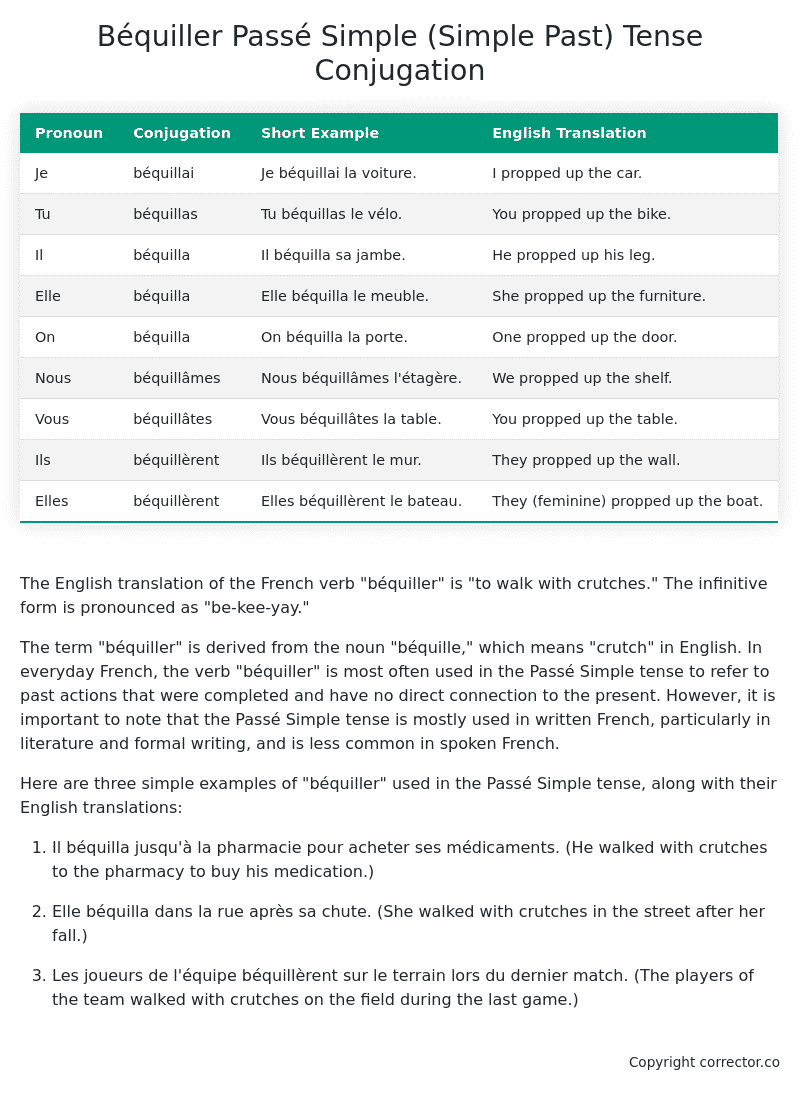Passé Simple (Simple Past) Tense Conjugation of the French Verb béquiller
Introduction to the verb béquiller
The English translation of the French verb “béquiller” is “to walk with crutches.” The infinitive form is pronounced as “be-kee-yay.”
The term “béquiller” is derived from the noun “béquille,” which means “crutch” in English. In everyday French, the verb “béquiller” is most often used in the Passé Simple tense to refer to past actions that were completed and have no direct connection to the present. However, it is important to note that the Passé Simple tense is mostly used in written French, particularly in literature and formal writing, and is less common in spoken French.
Here are three simple examples of “béquiller” used in the Passé Simple tense, along with their English translations:
-
Il béquilla jusqu’à la pharmacie pour acheter ses médicaments.
(He walked with crutches to the pharmacy to buy his medication.) -
Elle béquilla dans la rue après sa chute.
(She walked with crutches in the street after her fall.) -
Les joueurs de l’équipe béquillèrent sur le terrain lors du dernier match.
(The players of the team walked with crutches on the field during the last game.)
Table of the Passé Simple (Simple Past) Tense Conjugation of béquiller
| Pronoun | Conjugation | Short Example | English Translation |
|---|---|---|---|
| Je | béquillai | Je béquillai la voiture. | I propped up the car. |
| Tu | béquillas | Tu béquillas le vélo. | You propped up the bike. |
| Il | béquilla | Il béquilla sa jambe. | He propped up his leg. |
| Elle | béquilla | Elle béquilla le meuble. | She propped up the furniture. |
| On | béquilla | On béquilla la porte. | One propped up the door. |
| Nous | béquillâmes | Nous béquillâmes l’étagère. | We propped up the shelf. |
| Vous | béquillâtes | Vous béquillâtes la table. | You propped up the table. |
| Ils | béquillèrent | Ils béquillèrent le mur. | They propped up the wall. |
| Elles | béquillèrent | Elles béquillèrent le bateau. | They (feminine) propped up the boat. |
Other Conjugations for Béquiller.
Le Present (Present Tense) Conjugation of the French Verb béquiller
Imparfait (Imperfect) Tense Conjugation of the French Verb béquiller
Passé Simple (Simple Past) Tense Conjugation of the French Verb béquiller (You’re reading it right now!)
Passé Composé (Present Perfect) Tense Conjugation of the French Verb béquiller
Futur Simple (Simple Future) Tense Conjugation of the French Verb béquiller
Futur Proche (Near Future) Tense Conjugation of the French Verb béquiller
Plus-que-parfait (Pluperfect) Tense Conjugation of the French Verb béquiller
Passé Antérieur (Past Anterior) Tense Conjugation of the French Verb béquiller
Futur Antérieur (Future Anterior) Tense Conjugation of the French Verb béquiller
Subjonctif Présent (Subjunctive Present) Tense Conjugation of the French Verb béquiller
Subjonctif Passé (Subjunctive Past) Tense Conjugation of the French Verb béquiller
Subjonctif Imparfait (Subjunctive Imperfect) Tense Conjugation of the French Verb béquiller
Subjonctif Plus-que-parfait (Subjunctive Pluperfect) Tense Conjugation of the French Verb béquiller
Conditionnel Présent (Conditional Present) Tense Conjugation of the French Verb béquiller
Conditionnel Passé (Conditional Past) Tense Conjugation of the French Verb béquiller
Conditionnel Passé II (Conditional Past II) Tense Conjugation of the French Verb béquiller
L’impératif Présent (Imperative Present) Tense Conjugation of the French Verb béquiller
L’impératif Passé (Imperative Past) Tense Conjugation of the French Verb béquiller
L’infinitif Présent (Infinitive Present) Tense Conjugation of the French Verb béquiller
L’infinitif Passé (Infinitive Past) Tense Conjugation of the French Verb béquiller
Le Participe Présent (Present Participle) Tense Conjugation of the French Verb béquiller
Le Participe Passé (Past Participle) Tense Conjugation of the French Verb béquiller
Struggling with French verbs or the language in general? Why not use our free French Grammar Checker – no registration required!
Get a FREE Download Study Sheet of this Conjugation 🔥
Simply right click the image below, click “save image” and get your free reference for the béquiller Passé Simple tense conjugation!

Béquiller – About the French Passé Simple (Simple Past) Tense
Formation
Usage
Narration
Historical Context
Interactions with other tenses
Passé Composé
Imparfait
Conditional and Subjunctive
Summary
I hope you enjoyed this article on the verb béquiller. Still in a learning mood? Check out another TOTALLY random French verb conjugation!


